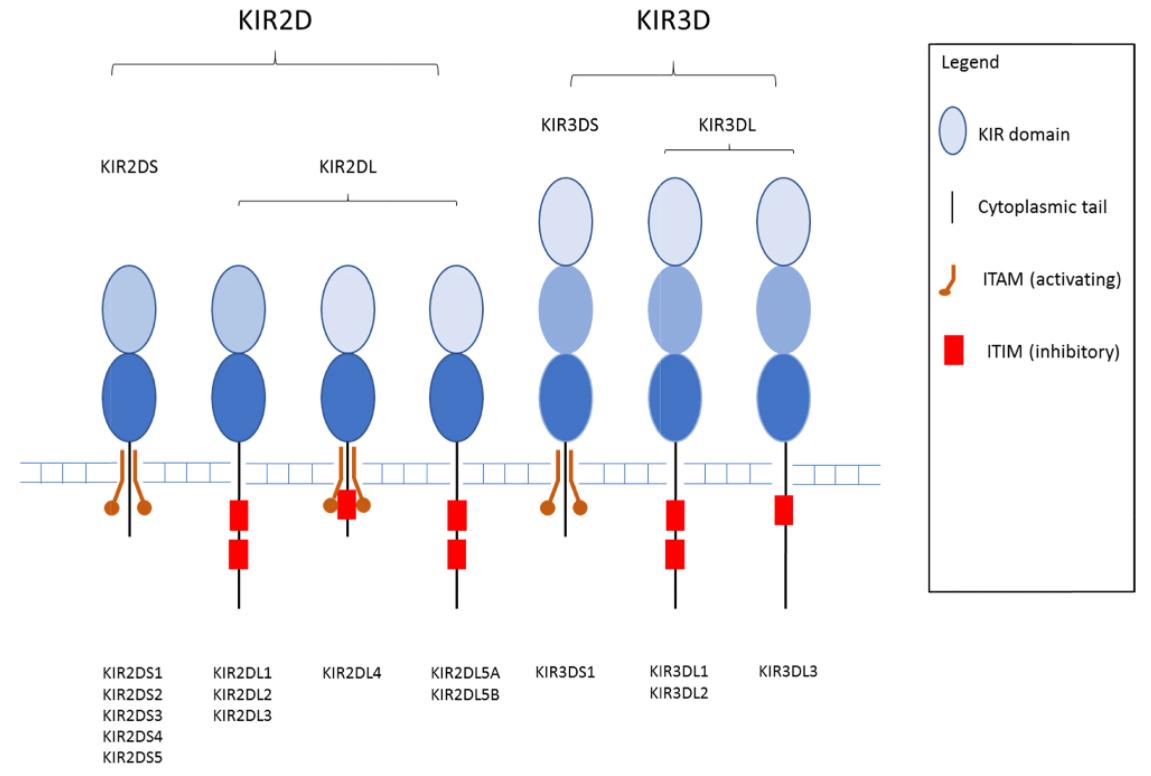Equipped with state-of-the-art facilities and experienced immunology experts, Creative Biolabs is dedicated to genotyping services for our global clients. With advanced technology platforms and extensive expertise, we are ready to provide you with high-quality KIR typing services.
As an important lymphocyte population in the innate immune system, natural killer (NK) cells are critical in lysing the infected cells or cancer cells without adaptive immune response mediated by antigen stimulation. Killer-cell immunoglobulin-like receptors (KIRs) are type I transmembrane glycoproteins expressed on NK cells, and they can interact with major histocompatibility (MHC) class I molecules to mediate the inhibitory or activated NK cell activities. For normal healthy tissues, negative regulation of NK cell happens via the recognition of MHC molecules with inhibitory KIRs. For infected cells or transformed cells, NK cells can lyse the target cells through activated KIRs. KIR molecules are highly polymorphic, and the sequences are different between individuals. KIR family consists of 15 gene loci, including KIR2DL1, KIR2DL2/L3, KIR2DL4, KIR2DL5A, KIR2DL5B, KIR2DS1, KIR2DS2, KIR2DS3, KIR2DS4, KIR2DS5, KIR3DL1/S1, KIR3DL2, KIR3DL3, and two pseudogenes, KIR2DP1 and KIR3DP1 (see Fig.1).
 Fig.1 KIR proteins.1
Fig.1 KIR proteins.1
To investigate the polymorphism of KIRs, Creative Biolabs offers a series of KIR typing services to our clients, including KIR typing at the DNA and mRNA level, as well as KIR phenotyping by FACS.
With novel technology platform and professional senior scientists, Creative Biolabs provides a full spectrum of KIR typing services covering all KIR genes and alleles. We are committed to offering customized solutions to fit our clients' specific requirements. Please feel free to contact us for more details.
Reference
For any technical issues or product/service related questions, please leave your information below. Our team will contact you soon.
All products and services are For Research Use Only and CANNOT be used in the treatment or diagnosis of disease.
 NEWSLETTER
NEWSLETTER
The latest newsletter to introduce the latest breaking information, our site updates, field and other scientific news, important events, and insights from industry leaders
LEARN MORE NEWSLETTER NEW SOLUTION
NEW SOLUTION
CellRapeutics™ In Vivo Cell Engineering: One-stop in vivo T/B/NK cell and macrophage engineering services covering vectors construction to function verification.
LEARN MORE SOLUTION NOVEL TECHNOLOGY
NOVEL TECHNOLOGY
Silence™ CAR-T Cell: A novel platform to enhance CAR-T cell immunotherapy by combining RNAi technology to suppress genes that may impede CAR functionality.
LEARN MORE NOVEL TECHNOLOGY NEW SOLUTION
NEW SOLUTION
Canine CAR-T Therapy Development: From early target discovery, CAR design and construction, cell culture, and transfection, to in vitro and in vivo function validation.
LEARN MORE SOLUTION